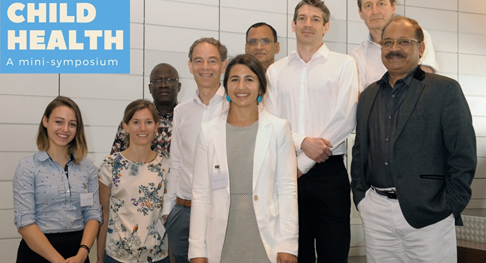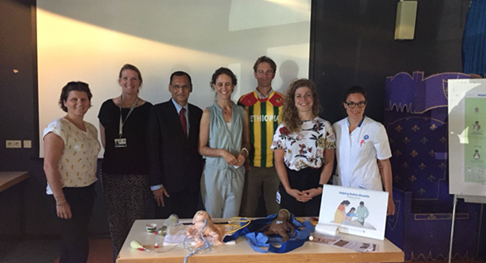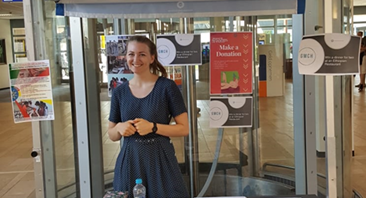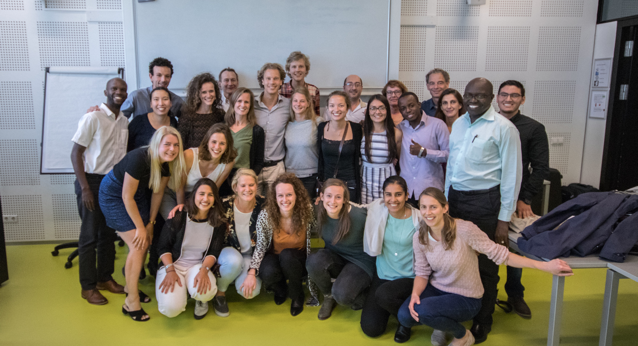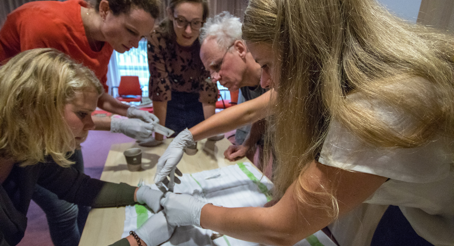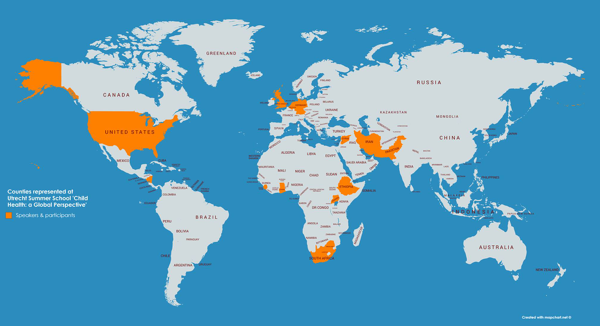Events
.
Webinar RSV GOLD
On Thursday June 25th, our first live webinar “RSV-related Mortality: The RSV GOLD study” took place. During this webinar, drs. Natalie Mazur and drs. Yvette Löwensteyn (project leader) informed the viewers about the RSV GOLD study and showed preliminary results from different projects within RSV GOLD.
The presentation slides are available for download here. If you are interested in receiving a replay, or have any questions following the webinar, do not hesitate to contact us at rsvgold@umcutrecht.nl.
.
RSV GOLD Independent Scientific Advisory Board Meeting November 2019
On November 12, 2019, the second RSV GOLD Independent Scientific Advisory Board meeting took place during the RSVVW’19 conference in Accra, Ghana. The aim of the meeting was to discuss the RSV GOLD project process and to establish new goals for our future projects. We look back positively on an informative, stimulating and fruitful meeting. We thank all the ISAB meeting participants for their great input.
.
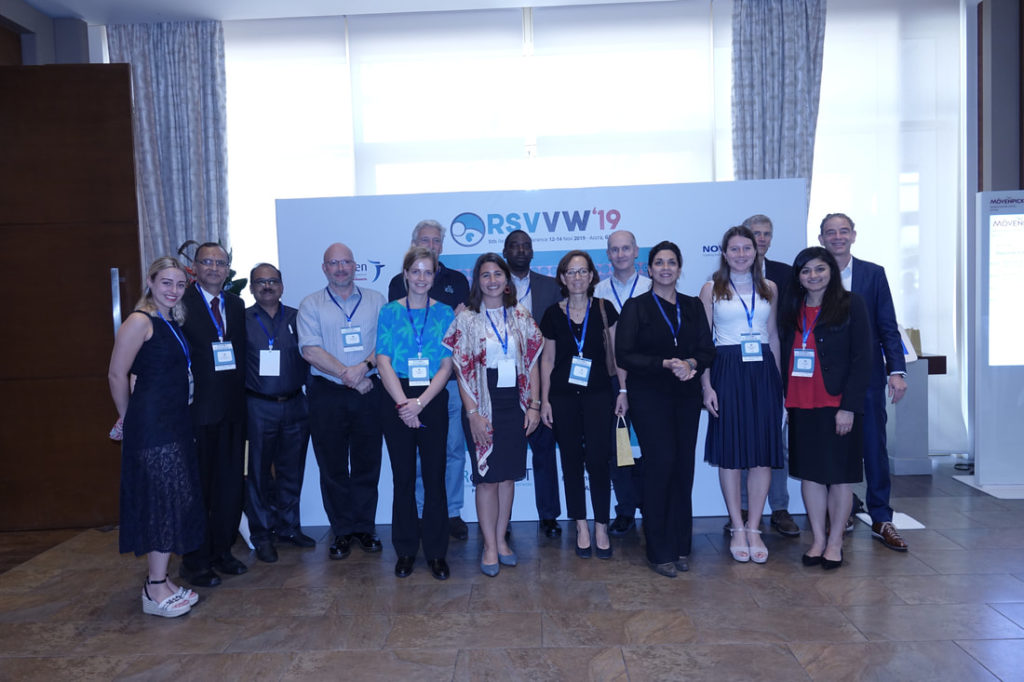
.
RSVVW’19 – A Global Conference on Novel RSV Interventions
On November 12-14, the ReSViNET foundation hosted its 5th conference in Accra, Ghana. The latest research focusing on prevention and treatment of RSV infection was presented by several researchers from around the world. Included topics were burden of RSV disease, molecular virology, RSV immunology, RSV-related recurrent wheeze and asthma and clinical advancements of RSV vaccines and antibodies. Almost 300 attendees from 43 countries attended the conference. RSV GOLD was presented by Natalie Mazur. The highlights of the conference were summarized by Louis Bont and Natalie Mazur during a webinar. More information about the conference can be found on the RSVVW’19 website.
.
Global Child Health Summer School July 2019
From 8-12 July, the second Global Child Health Summer School took place at University Medical Center Utrecht and Amsterdam Institute for Global Health and Development, the Netherlands. The summer school was fully booked, with 25 participants from 14 different countries: Kenya, Indonesia, Nigeria, Turkey, Canada, South Africa, Palestine, Rwanda, Afghanistan, Ghana, Finland, Russia, the United Kingdom and the Netherlands. The highly diverse group consisted of master’s students, researchers, nurses, pediatricians, tropical doctors, pediatric residents and global health specialists. There was a lot of fun and interaction, especially during the group project. Different global child health key topics were addressed during interactive lectures, including malnutrition, research ethics and RSV. Participants received a short Emergency Triage Assessment and Treatment course and learned about the helping babies breathe program during a hands-on workshop.
We look back on a very successful week and we are grateful for the possibility to connect with so many passionate people to contribute to global child health together.
 .
.
Global Child Health Summer School August 2018
We look back positively on the first global child health summer school. The course was a collaboration with Prof. Louis Bont (Professor of pediatric respiratory infections, University Medical Center Utrecht) and Prof. Michael Boelen van Hensbroek (professor of global child health, Amsterdam Medical Center).
There were 25 participants from across the globe: Nicaragua, Ghana, the United Kingdom, Sierra Leone, Iran, Syria, Ethiopia and the Netherlands. Participants included medical students and other master’s students (in the fields of international health, nutrition, public health and epidemiology), medical residents, PhD’s, and medical specialists (paediatricians, tropical doctors and general practitioners). The diversity of the group allowed both speakers and participants to contribute expertise to the summer school.
Diverse aspects of global child health were covered such as malaria, diarrheal diseases and vaccination (see schedule below) in a series of interactive lectures and case-based learning. The presentations were given by speakers from the Bill & Melinda Gates Foundation, the Respiratory and Meningeal Pathogens Unit (Soweto, South Africa), Makerere University (Kampala, Uganda), Fair Medicine, University of Edinburgh, the Amsterdam Institute for Global Health and Development (AIGHD), and various clinicians from the Wilhelmina Children’s Hospital. Part of the program was held at the headquarters of Doctors without Borders (MSF) in Amsterdam, part at the AIGHD and part at the University Medical Center in Utrecht (UMCU).
Overall participants evaluated the course with 9/10. The week was inspiring. Although people
came from very different backgrounds and parts of the world, everyone was driven by the
same passion: a drive to improve health for children globally.
.
Global Maternal & Child Health Day May 2018
With great pleasure we look back on a successful symposium that was organized in the context of Global Maternal and Child Health on 6 June in the University Medical Center Utrecht. Visitors from various institutions across the country attended presentations on a variety of Global Health themes, such as vaccinations and malaria. As a part of Helping Mothers and Babies Breathe in Ethiopa, diverse activities were organized, including interactive training sessions, a djembe workshop and a lecture on maternal and child health in developing countries. Professionals as well as children, parents and others engaged in the activities. Crowdfunding was initiated for the Helping Mothers and Babies Breathe in Ethiopia Project in order to enable purchase of equipment needed for medical training. One can contribute to better medical care through donation via www.actievoorwkz.nl.
.
RSV GOLD Independent Scientific Advisory Board Meeting May 2018
On the same day, a meeting with the RSV GOLD Independent Scientific Advisory Board took place. This moment of reflection on the progress and future perspectives of the RSV GOLD Project brought forward action points to ensure further advancement of the project. Several points of discussion included representation of low-income countries, expansion to community- and hospital-acquired RSV infection, preferred increase of outreach via networks and conferences and the desire for real-time data sharing. With the provided insights and recommendations in mind, we look forward to actively working towards an enhanced RSV GOLD project.
.
